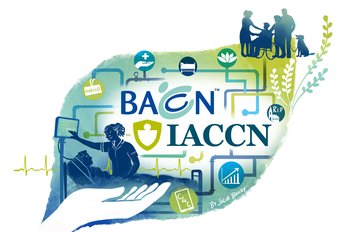BACCN Webinars
Contents |
Professional Nurse Advocate Role in Critical Care - pre-conference workshop, Blackpool, Oct 6 2025
Joint BACCN and CC3N Critical Care PNA Virtual Event - 9 December
View the video from our recent Joint BACCN and CC3N Critical Care PNA Virtual Event , held 9 December 2024
Please note the following 3 sessions are not on the recording: Dr Stephen Jones, Cath Applewhite, and Grace Cook sessions.
Below see the agenda for the day and (left column) see links to the presentations that have been made available to us to date.
|
Welcome and Housekeeping |
Karen Wilson, Lead Nurse Cheshire and Mersey Critical Care Network / PNA / Lead for National Critical Care PNA Community of practice. |
|
The Guideline for Implementing PNAs in Critical Care Development and Implications |
Dr Julie Highfield, Consultant Clinical Psychologist Wellbeing Director – Intensive Care Society |
|
The value of a full-time PNA in Critical Care. |
Vicky Golden, Lead PNA for Critical Care and Sandra Barrington, Matron Critical Care University Hospitals, North Midlands |
|
Impact and evaluation of implementing the Professional Nurse Advocate (PNA) at OUH |
Katy Powell, Professional Nurse Advocate Lead, Practice Development & Education Jessica Pountney, Health and Wellbeing Lead - Professional Nurse Advocate Adult Intensive Care Unit, Oxford University Hospitals NHS Trust |
|
Professor Liz Deutsch-Lees, Professor for Nursing Practice, and Dr Laura Wilde, Clinical Fellow, Centre for Healthcare and Communities, Coventry University |
|
|
Kathy Yorke Wellbeing Lead, PNA, and Amy Pollitt Lead Educator/PNA, Sheffield Teaching Hospital NHS Trust. |
|
|
Joanna Mann, PNA and ITU Professional Development Sister, UHB NHS Trust |
|
|
RCN PNA standards and accreditation |
Dr Stephen Jones, Head of Nursing Practice Royal College of Nursing |
|
Cath Applewhite , PNA Lead, Manchester Foundation NHS Trust |
|
|
Resilience-based Clinical Supervision for Critical Care PNAs |
Grace Cook, Person-centred Practice Facilitator, and Sonia Denton Smith, RBCS Project Manager, Foundation of Nursing Studies |
|
Structures in place to support Professional Nurse Advocate Role |
Vicky Hughes, NHSE regional PNA lead for Northwest Region |
|
Amy Stallard, Development Clinical Nurse Specialist Lucy Corn, Critical Care and Acute Care Lecturer |
|
|
Closing remarks |
Karen Wilson, Lead Nurse Cheshire and Mersey Critical Care Network / PNA / Lead for National Critical Care PNA Community of practice. |
Past Event Resources
In addition to the below, recordings of past regional study events can be found in the Members Area HERE
View the video from our recent Joint BACCN and CC3N Critical Care PNA Virtual Event , held 9 December 2024
Please note the following 3 sessions are not on the recording: Dr Stephen Jones, Cath Applewhite, and Grace Cook sessions.
Below see the agenda for the day and (left column) see links to the presentations that have been made available to us to date.
|
Welcome and Housekeeping |
Karen Wilson, Lead Nurse Cheshire and Mersey Critical Care Network / PNA / Lead for National Critical Care PNA Community of practice. |
|
The Guideline for Implementing PNAs in Critical Care Development and Implications |
Dr Julie Highfield, Consultant Clinical Psychologist Wellbeing Director – Intensive Care Society |
|
The value of a full-time PNA in Critical Care. |
Vicky Golden, Lead PNA for Critical Care and Sandra Barrington, Matron Critical Care University Hospitals, North Midlands |
|
Impact and evaluation of implementing the Professional Nurse Advocate (PNA) at OUH |
Katy Powell, Professional Nurse Advocate Lead, Practice Development & Education Jessica Pountney, Health and Wellbeing Lead - Professional Nurse Advocate Adult Intensive Care Unit, Oxford University Hospitals NHS Trust |
|
Professor Liz Deutsch-Lees, Professor for Nursing Practice, and Dr Laura Wilde, Clinical Fellow, Centre for Healthcare and Communities, Coventry University |
|
|
Kathy Yorke Wellbeing Lead, PNA, and Amy Pollitt Lead Educator/PNA, Sheffield Teaching Hospital NHS Trust. |
|
|
Joanna Mann, PNA and ITU Professional Development Sister, UHB NHS Trust |
|
|
RCN PNA standards and accreditation |
Dr Stephen Jones, Head of Nursing Practice Royal College of Nursing |
|
Cath Applewhite , PNA Lead, Manchester Foundation NHS Trust |
|
|
Resilience-based Clinical Supervision for Critical Care PNAs |
Grace Cook, Person-centred Practice Facilitator, and Sonia Denton Smith, RBCS Project Manager, Foundation of Nursing Studies |
|
Structures in place to support Professional Nurse Advocate Role |
Vicky Hughes, NHSE regional PNA lead for Northwest Region |
|
Amy Stallard, Development Clinical Nurse Specialist Lucy Corn, Critical Care and Acute Care Lecturer |
|
|
Closing remarks |
Karen Wilson, Lead Nurse Cheshire and Mersey Critical Care Network / PNA / Lead for National Critical Care PNA Community of practice. |
Online read through of a new playscript - Critical Care
Date: 4th September 2023
BACCN members were invited to contribute feedback to an online read through of a new playscrip by Stacey Moon-Tracy, Post Graduate Researcher at Coventry University
Inspired & informed by the COVID-19 testimony & creative voices of ICU nurse collaborators.
Critical Care PNA’s Virtual Event
14th of March 2023
The BACCN and CC3N are both members of the UK Critical Care Nursing Alliance and have collaborated on several projects over the last couple of years.
In response to and following the first wave of the pandemic, Ruth May (Chief Nursing Officer for England) announced in March 2021 the immediate roll out of the Professional Nurse Advocate (PNA) Programme in England. Starting with 400 critical care nurses initially with more currently undertaking their training, the overall aim is that every Critical Care Unit in England would have two PNAs by end of 2022. CC3N assisted NHSEI in the roll out of the first two cohorts of PNA training in England.
The PNA is a qualified practising nurse who has undertaken a Level 7 accredited programme that has been developed around the Advocating for Education and Quality Improvement (A-EQUIP model) initially introduced into Midwifery in 2017. The A-EQUIP model includes Restorative Clinical Supervision (RCS), which research shows has a direct impact on recruitment, retention, staff engagement, compassion fatigue and reducing sickness. The model also has an emphasis on education, development, and quality improvement. All of which will have a positive impact on patient safety and experience.
Whilst having undertaken the training and become qualified PNA's there is still major differences in the time and resources PNA's get to do the role within their units. CC3N have written best practice guidelines for the PNA within Critical Care, and we recommend that all PNAs received the minimum (at the very least) of 12.5 hours per month to do the role. This time should be included within the PNA's substantive post as a critical care nurse. CC3N have created a national virtual community of practice for critical care PNA’s to provide a unified voice for them and help fully embed the role into critical care practice.
There are still many PNA's within Critical Care across the country not receiving any time to undertake the role - many are doing RCS sessions in their own time or in their annual leave time still and many organisations still do not recognise the importance in having the role in practice. There is also a need to promote of the benefits of the PNA role in Critical Care nationally and this should be included in the next GPICS update. It will be included in the National ACC wellbeing strategy (not sure when this is going to be published but it is nearly finished)
Within a recent CC3N workforce survey (with 3145 responses from 195 units across 18 Critical Care networks in England):
- 49% of survey respondents did not know what a PNA did or who the PNA was on their unit
- 14 % had not been offered an RCS session as the PNA did not have allocated time to offer
This event was to:
- Provide a national PNA update
- Share case studies of successful implementation
- Facilitate workshops with themes identified through a survey / poll of current PNA’s with regards to what barriers existing PNA’s face in implementing the work within their individual units and how this can be overcome
- BACCN True Colours Wellbeing Award 2023
Slides from the event can be found in the members area HERE
PAST EVENT: Creating an inclusive culture for Ethnic Minorities in critical care
Date: 26th August 2020 7pm
BACCN Facilitators – Nicki Credland & Colette Laws Chapman
BAME nurses are underrepresented in the NHS & specifically in senior positions, we also know they are underrepresented in our National Board and Regional Committees
In this webinar Dame Elizabeth Anionwu, Professor of Nursing UWL. Professor Calvin Moorley, LSBU and Nordeya Gilbert, Practice Development Nurse, GSTT led a discussion on how we can start the conversations around race inclusivity in critical care
List of invited speakers
- Dame Elizabeth Aanionwu - Professor Dame Elizabeth Nneka Anionwu is an Emeritus Professor of Nursing at the University of West London. In 1979 she set up the first ever UK sickle cell/thalassaemia nurse counselling service, based in Brent. Elizabeth then became a senior lecturer in Community Genetic Counselling at the University College London’s Institute of Child Health. Prior to retirement in 2007, she was Dean of the School of Adult Nursing Studies & Professor of Nursing at University of West London (UWL), before establishing the Mary Seacole Centre for Nursing Practice, also at UWL. Elizabeth was awarded a CBE in 2001 for services to nursing and became a Dame in 2017 when awarded a DBE in the Queen’s New Year’s Honours for services to nursing and the Mary Seacole Statue Appeal. In 2019 she was awarded a Pride Of Britain Lifetime Achievement Award.
- Professor Calvin Moorley -Dr Moorley is a Senior Lecturer in adult nursing and has an academic background in public health and health promotion. He is a registered nurse (Adult) and practices in intensive care therapy. His research focuses on the interplay of gender, culture ethnicity and health. He is also holder of the Mary Seacole Award for Leadership in Nursing
- Nordeya Gilbert - Nordeya migrated from Jamaica and graduated from Hertfordshire University as a Registered General Nurse. She has over 16 years’ experience in Clinical Practice and specialised as an Intensive Care Nurse. Nordeya is currently an Intensive Care Practice Development Nurse at Guys and St Thomas Hospital, her role is to improve care for patients by developing clinical practice. Her passion for supporting and developing others shows in her work to achieve excellence in patient care.
Topics for discussion:
- What have been your experiences and how have you overcome them?
- What would you like to see in the future?
- Leadership representation – what are the issues and possible solutions
- Committee representation – how can we engage
What are your thoughts on:
- Developing BAME leaders
- Mentorship / reverse mentorship for all
- Unconscious bias / other training
- How we teach to reflect BAME – eg manikins, / bruising
- BACCN having an equality & diversity and inclusion lead
- How BACCN can use social medical to influence





